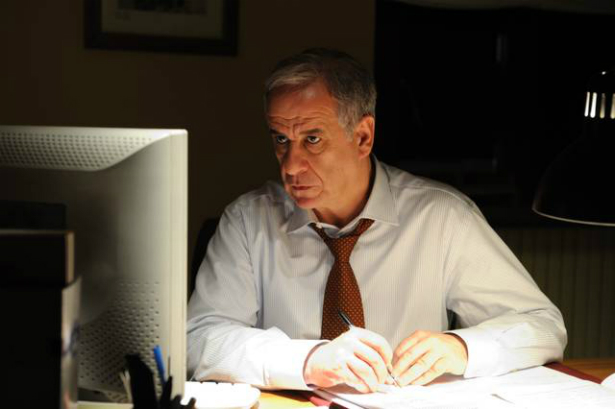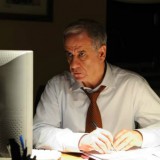One of my favorite delights, as you could imagine, is attending film festivals, preferably in Italy. And when I have a chance load up with ton of books. I try to buy either the latest Italian bestsellers or books about some of my favorite Italian directors.
Last year I attended Rome International Film Festival, and out of that trip I found this book titled Gli anni edison – i volti e le mani (The Faces and Hands) by Benedetta Tobagi. It’s part of a series where each book is dedicated to a specific director with attached DVD of rare footage. This book is dedicated to Ermanno Olmi with some great footage of his early documentary work at EdisonVolta – more about this book in a separate post. Promise!
The reason for this long intro, is the following quote by Olmi that I find relevant to this film:
Il cinema e’ un modo per rapportarsi al mondo. O usi il cinema per fare diventare il realta una favola o usi il cinema per convivere con la realta.
Cinema is a vehicle to reference the world. You either use cinema for turning reality into a fairy tale or you use cinema for acknowledging reality.
In his second feature film, director Andrea Molaioli, use the second role Olmi is talking about regarding cinema’s responsibility to reflect actual events that impacted many. The film is largely inspired by one of the darkest chapters in Italian economy in the 21st century – the financial crisis of multinational Italian dairy and food corporation, crac Parmalat.
 Toni Servillio, as the relentless CFO Ernesto Botta, deep in work,
Toni Servillio, as the relentless CFO Ernesto Botta, deep in work,
manning the numbers in his dark office
If you liked Toni Servillio in Paolo Sorrentino’s La grande bellezza – The Great Beauty, then this film will make you appreciate his performance range even more. Servillio provides a fantastic performance of a cold, arrogant and super loyal CFO, Ernesto Botta, that will do anything – including finally fudging numbers – to save the future of Leda – this fictional dairy company. Remo Girone plays the old style CEO Amanzio Rastelli that blindly trusts Botta’s flawed judgment.
This out of control business strategy starts by CEO Rastelli refusing to let go of his losing investments like a favorite soccer team, his insistence on keeping his 51% majority control, or his investment in a losing travel company, where he places his granddaughter Laura Aliprandi (Sarah Felberbaum). The international backers want to know why all these investments do not yield a profit. Rastelli refuses to reveal the true status of the growing debts and opting for series of fraudulent acts.
 The film’s poster. I especially liked the opening tag line:
The film’s poster. I especially liked the opening tag line:
“se i soldi non ci sono, inventiamoceli – if we don’t have the numbers, let’s invent them”
The film’s spiraling down plot provides an eloquent, yet grim view of modern financial operations, where real goods and services provide a realistic financial value (i.e., you sell massive amount of yogurt and get its worth plus profit). However, as we all know companies don’t stop there and leverage that initial value in the present to further trade in parallel future financial fantasy pyramids, that sometimes collapse and not only affect an entire company and its employees, but also hundreds of thousands of individual investors who in Parmalat’s case, lost their money and would never recover it. On the radical end of this view, you can include some of today’s latest hot Internet darlings that never made a dime, but are valued in the billions.
[youtube width=”615″ height=”514″]http://youtu.be/h5Zc8VmBcso[/youtube]
The official trailer
A similar political cinema, you can trace back to the classic work of director Francesco Rosi. In this film, I particularly see artistic nods to Le Mani Sulla Città – Hands over the City – (Francesco Rosi – 1963).
The film distills its pessimistic assessment with the following ending statement:
Negli ultimi anni
il dominio della finanza sull’economia reale
ha prodotto vere e proprie
truffe a danno dei risprarmiatoriNonostante glie allarmi ed i numerosi casi di crac che hanno investito importanti societa
in tutto il mondo,
ad oggi il valori dei prodotti finanziari presenti sui mercati
e almeno dieci volte superiore
a quello dei beni e dei servizi reali.In recent years
the supremacy of finance over the actual economy
has resulted in serious fraud against saversDespite warnings and numerous financial crashes
involving major companies around the world,
the value of financial packages in the marketplace today
is at least ten times superior to that goods and services

